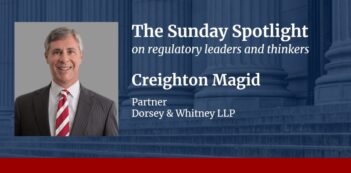
A proposed rule aims to facilitate economic growth at the expense of federal environmental reviews.
“While our world is burning, President Trump is adding fuel to the fire by taking away our right to be informed and to protect ourselves from irreparable harm.” So claimed Gina McCarthy, the president of the national environmental group Natural Resources Defense Council, in response to a new proposed rule that would change federal procedures for environmental review under the National Environmental Policy Act (NEPA).
The National Environmental Policy Act—one of the foundational environmental laws in the United States—prevents the federal government from undertaking large construction projects such as bridges, tunnels, pipelines, and highways without first conducting a detailed environmental review. This sweeping environmental law, however, appears to have become the latest target on the Trump Administration’s deregulatory agenda.
A new NEPA rule, proposed earlier this year, would fundamentally alter the way in which federal agencies must implement NEPA, argue national environmental groups. The proposed changes include imposing stricter deadlines on the environmental review process, allowing private entities to conduct reviews in place of federal agencies, narrowing the scope of federal actions that trigger NEPA review, and restricting the public comment process.
Perhaps the most striking of the proposed changes is that federal agencies would no longer have to assess the “cumulative impacts” of a project—a phrase which courts have interpreted to include the impacts of projects on greenhouse gas emissions and climate change.
NEPA mandates that for any “major federal actions significantly affecting the quality of the human environment” the responsible official must submit a detailed report including: the environmental impact of the proposed action, any adverse environmental effects which cannot be avoided, and alternatives to the proposed action. Among other things, NEPA also created the Council on Environmental Quality (CEQ).
Several years after Congress enacted NEPA, President Jimmy Carter issued an Executive Order directing the CEQ to issue guidelines and regulations to federal agencies concerning the implementation of NEPA and to make environmental impact statements more useful for decisionmakers and the public. In the recently proposed rule, the CEQ claims that its proposed updates to these regulations will “modernize and clarify the regulations to facilitate more efficient, effective, and timely NEPA reviews by federal agencies.”
The CEQ’s stated goal of streamlining the NEPA review process stems from the Trump Administration’s recent frustrations concerning what President Trump has referred to as a “dysfunctional bureaucratic system” that impedes economic progress.
“In the past, many of America’s most critical infrastructure projects have been tied up and bogged down by an outrageously slow and burdensome federal approval process,” said President Trump in reference to NEPA.
President Trump’s appointees at CEQ claim that once the proposed rule is finalized, the federal permitting timeline for many projects will be reduced to less than two years, compared to the current average of four and a half years.
Although the proposed rule is designed to facilitate economic growth, many scholars and activists charge that the rule will achieve that goal at the expense of environmental protection. For example, under the proposed rule, agencies would have greater flexibility to allow project sponsors and private contractors to take on a greater role in preparing environmental impact statements and other reviews. Some environmental groups worry that allowing federal agencies to delegate the review process to private contractors, who are economically motivated to ensure that a project moves forward, would undermine the goals of NEPA.
Critics of the proposed rule also worry that minority communities will bear the brunt of potentially harmful environmental consequences. For example, several studies have found that minority and impoverished communities are disproportionately subjected to air pollution. Until now, whenever the federal government was considering undertaking a new project, these communities were at least entitled to submit comments addressing the proposals and the environmental impact statements.
Under the new rule, however, individuals from communities where environmental impacts are often felt the hardest will have a tougher time engaging in the public comment process. The new rule imposes stricter and more technical requirements on public comments, including requirements that “comments should reference the corresponding section or page number of the draft environmental impact statement, propose specific changes to those parts of the statement, where possible, and include or describe the data sources and methodologies supporting the proposed changes.”
“Under the guise of streamlining regulations they’ve painted as bad for business, Trump’s Administration could make it harder for communities to use the safeguards afforded by NEPA, while also handing giveaways to dirty energy special interests,” claim representatives from Earthjustice, a national environmental group.
In addition, although the impetus of the new rule is a desire to speed up the federal approval process for government projects, it may have the complete opposite effect. Richard Revesz, an environmental law professor at New York University, has reportedly argued that the accelerated environmental review process will render federal agencies more vulnerable to administrative and judicial challenges, potentially “leading to far longer delays than if they had done a proper analysis in the first place.”
The CEQ will accept comments on its proposed rule until March 10, 2020.



